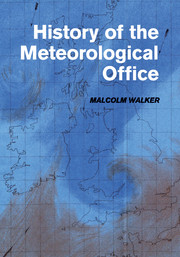Book contents
- Frontmatter
- Contents
- Illustrations
- Foreword
- Additional Commentary
- Acknowledgements
- Abbreviations
- 1 Seeds Are Sown
- 2 Statistics and Storms
- 3 Inquiry and Criticism
- 4 The Fight over Forecasts
- 5 Squalls and Settled Spells
- 6 The Emergence of Science
- 7 A Decade of Change
- 8 The Great War
- 9 The Inter-War Period
- 10 The Clouds of War
- 11 Aftermath of War to Forecasting by Numbers
- 12 Global Meteorology
- 13 Winds of Change
- Index
- References
- Frontmatter
- Contents
- Illustrations
- Foreword
- Additional Commentary
- Acknowledgements
- Abbreviations
- 1 Seeds Are Sown
- 2 Statistics and Storms
- 3 Inquiry and Criticism
- 4 The Fight over Forecasts
- 5 Squalls and Settled Spells
- 6 The Emergence of Science
- 7 A Decade of Change
- 8 The Great War
- 9 The Inter-War Period
- 10 The Clouds of War
- 11 Aftermath of War to Forecasting by Numbers
- 12 Global Meteorology
- 13 Winds of Change
- Index
- References
Summary
The first ‘flying machines’ were flimsy and the motions of the atmosphere capricious. Many an early aeroplane was damaged or wrecked when dashed to the ground by an unexpected gust of wind. The pioneers of aviation certainly needed meteorological assistance, and the French pilot Louis Paulhan did indeed gain some when, in April 1910, he won the prize of £10,000 offered by the Daily Mail for being the first to fly between London and Manchester in under twenty-four hours. The Meteorological Office made elaborate provision to keep him supplied with information about the prospective weather en route.
The Emergence of Aeronautics
The Prime Minister, Herbert Asquith, informed the House of Commons on 5 May 1909 that the Government wished to apply the “highest scientific talent” to problems of aerial navigation. He had appointed a special committee which would be chaired by Dr Glazebrook, Director of the NPL, and include among its members Dr Shaw, Director of the Office.
- Type
- Chapter
- Information
- History of the Meteorological Office , pp. 180 - 222Publisher: Cambridge University PressPrint publication year: 2011



